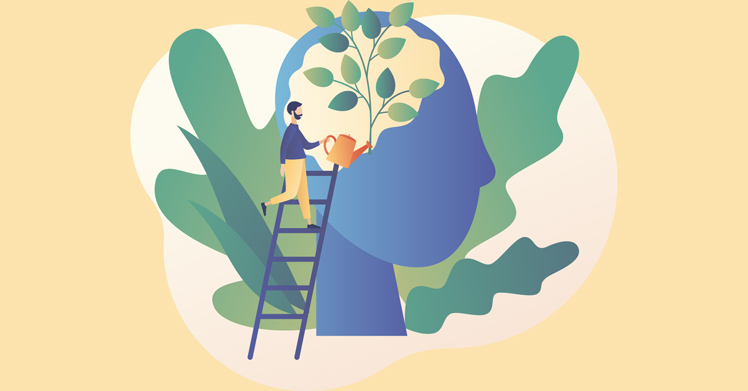Andy Elwood explores five ways to improve your mental health by being your own best friend….
We’ve all had rough patches in the last year and the way I’ve coped is by using a technique I like to call ‘being your own best friend’. Here are five ways that’ll help to you to do the same…
Pause
We live in a very 24/7 world, and it can sometimes feel like you’re on a hamster wheel. When things are like this, it can be a great idea to press pause to give yourself a little bit of perspective.
Instead of charging around at 99 miles an hour, take a pause. It might be once a day, or even multiple times a day. When pausing, do something that re-charges you, such as taking your lunch outside, going for a walk, or going to the park on your coffee break. These things can really help when things get too much and we just need a break.
Stress container
When you’re on pause, it’s time to do an assessment of your stress container, which, in a nutshell, is a simple V shaped diagram.
Inside, write the things that you’re feeling stressed about. For example it could be work, family, finances, or a relationship.
The stress goes in at the top and then, at the bottom, imagine there is a little tap where things can be let out. This tap is your positive coping strategies, your way to recharge your batteries. These may be things like exercise, seeing loved ones, or distracting yourself by enjoying your hobby.
Then think about your stress signature. By this I mean a sign that you’re stressed, and that things are getting too much. You may not know what it is, so ask a close colleague or a partner because they might know.
You’ll sometimes see it in others, and it may be that they’re snappy or frustrated. If you notice that in yourself, or someone else does, it is time to turn on the tap and use positive coping strategies to reduce what is in the stress container.
Five ways to wellbeing
There are a number of ways that you can improve your wellbeing, and they can be really small things that have a big impact.
One is to connect and talk to people. It might be people that you know and that you trust, and you can chat to them about some of their positive news as a way of connecting with them.
A second is to be active and do some exercise, as it can be an effective antidepressant and helps us feel good.
Go and try something new. This doesn’t have to be formal, it can be going on YouTube and learning how to fix something, for example. It’s simple and keeps the mind active and focused, while giving you a sense of purpose and achievement.
Another is taking notice and using mindfulness to connect with your senses, and this helps you live in the moment and not think about the past or the future.
And finally, another wellbeing booster is to give something back. Our most valuable thing is our time, so meet up and listen to others and it’ll help you feel good and give you a purpose. This is about looking out rather than in.
RAIN
This technique is simple and stands for Recognise, Acknowledge, Investigate and Non-identify.
If you’re feeling stressed or worried or anxious, talking about how you’re feeling and offloading can help you feel better.
It is important to recognise when you’re feeling certain things, and to realise it’s okay to feel the way you do.
Using the RAIN technique, be curious and ask yourself why you’re feeling like you are, what sensations you have in your body and if there is any evidence for feeling like that perhaps. Then just let go, which is the non-identifying part.
The best way to look at it is to think, ‘it’s okay to feel like this, but it doesn’t define me and who I am’. Nothing lasts forever, even difficult emotions are temporary. If you’re stressed about something and you can’t do anything about that certain thing, then it can be helpful to think just that. Acknowledge that you can’t do anything about it and then just let it go. This is like surfing the wave of emotion rather than trying to push back against the tide.
Talk to yourself
Often we’re our own harshest critic and we say things in our heads that we would never dream of saying to a friend or a loved one. So, try and be more positive and caring to yourself.
When a harsh thought comes into your head, ask yourself, is there evidence for this or is this self-talk I am giving? And ask, would I say this to a friend?
That can help to get rid of unhelpful thinking habits and it can be a real game-changer for you. When I feel a conversation starting, I think about all these things about being my own best friend, and it breaks any unhelpful thoughts.
